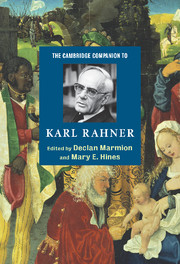Book contents
- Frontmatter
- Introduction
- Part I Spiritual, Philosophical, and Theological Roots
- Part II Theological Investigations
- Part III Conversations Ongoing
- 12 Rahner amid modernity and post-modernity
- 13 Rahner’s reception in twentieth century Protestant theology
- 14 Karl Rahner
- 15 Rahner and religious diversity
- 16 Political and liberation theologies
- 17 Feminist theologies
- Part IV Retrospect and Prospect
- Appendix
- Index
13 - Rahner’s reception in twentieth century Protestant theology
from Part III - Conversations Ongoing
Published online by Cambridge University Press: 28 May 2006
- Frontmatter
- Introduction
- Part I Spiritual, Philosophical, and Theological Roots
- Part II Theological Investigations
- Part III Conversations Ongoing
- 12 Rahner amid modernity and post-modernity
- 13 Rahner’s reception in twentieth century Protestant theology
- 14 Karl Rahner
- 15 Rahner and religious diversity
- 16 Political and liberation theologies
- 17 Feminist theologies
- Part IV Retrospect and Prospect
- Appendix
- Index
Summary
The following short essay will rehearse and critique one of the best-known Protestant engagements with Rahner: George Lindbeck's reading of Rahner in The Nature of Doctrine. This admittedly falls some way short of a comprehensive account of “twentieth century Protestant theology.” However, Lindbeck's criticisms of Rahner are probably the most important and most interesting, because of Lindbeck's influence upon Protestant theology, and because Lindbeck was an appreciative Protestant reader of Rahner.
Rahner has not been directly influential on Protestant theology, either dogmatic or philosophical, and in my judgment is unlikely to be in the future. This is not because Rahner is rejected in any emphatic way, or because his theology is deficient. It is for two reasons. One is that the problems Rahner tries to repair are often local problems: local to Roman Catholicism, and sometimes more specifically local to German Roman Catholicism. These local problems include, most obviously, questions of ecumenism (on the Catholic side) and questions of ecclesial authority. The second reason is that Rahner investigates the relationship between objective truth-claims and subjective experience, and the theories of truth with which he operates are no longer persuasive either to Catholics or Protestants. Whether one favours “linguistic” (Schleiermacher, Heidegger, Wittgenstein), or “pragmatic” (Peirce, Dewey, Rorty) tools, the theories of truth upon which Rahner depends fail to persuade contemporary theologians. Rahner is, like any theologian, a thinker of his age. Even Catholics who wish to learn from and use his theology will need to repair his philosophical apparatus.
- Type
- Chapter
- Information
- The Cambridge Companion to Karl Rahner , pp. 211 - 224Publisher: Cambridge University PressPrint publication year: 2005
- 1
- Cited by



